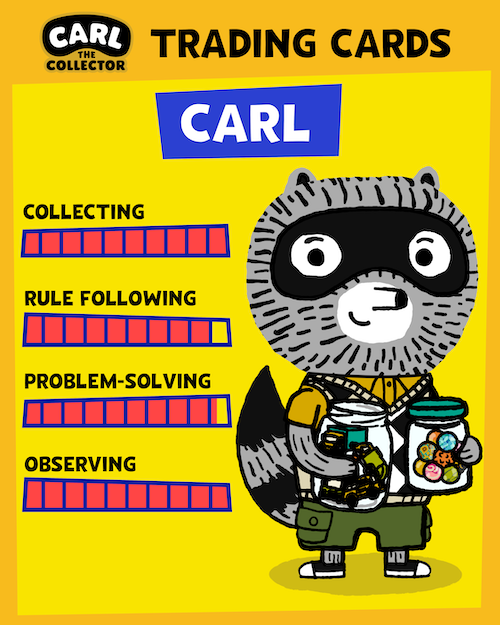
Section Branding
Header Content
Seeing Differently With Carl: Autism Acceptance Month
Primary Content

This April, as we honor Autism Acceptance Month, we invite families to slow down and look at the world a little differently—through the eyes of our thoughtful friend, Carl, from the PBS KIDS series "Carl the Collector". Carl is a curious, kind-hearted raccoon with a big imagination and an even bigger collection of treasures. From shiny buttons to crinkly wrappers and an assortment of fake mustaches, Carl notices the little things that make each item a treasure in his collection. He reminds us that every child experiences the world in their own unique way—and that those differences are not only okay, they are valuable.
Carl is also autistic. That means his brain works in wonderfully unique ways. He notices details others might miss, feels deeply, and often prefers routines and patterns. Sometimes he needs a little time or space to process new situations. By sharing Carl’s experiences, we can help kids build empathy and better understand how to support friends who experience the world differently.
Carl’s gentle curiosity can help young children begin to understand neurodiversity and kindness. And just like Carl, many children experience the world in ways that are delightfully unique. When we take time to understand and support their needs, we help them thrive—not in spite of their differences, but because of them. Here are a few meaningful ways to support children on the autism spectrum, at home and in our communities.
Notice and respond to all forms of communication
-
Gestures, sounds, eye movements, or repeated phrases can all be meaningful. Being present and responsive helps a child feel understood and connected.
Embrace Children's Interests
-
Following a child’s interests helps build trust, encourages learning, and creates meaningful opportunities to connect..
Help play feel safe and flexible
- Some children with autism may prefer using their own materials. With gentle support, we can help them explore playing alongside others in a way that feels comfortable.
Give time and space to process
-
Children with autism may need a little extra time to understand new information, transitions, or emotional experiences. Offering quiet moments without pressure shows respect for their pace and helps them feel safe and supported.
Be a friend, even from a little distance
- Some children with autism may need more alone time than others, and that’s okay. You can show up with kindness, patience, and understanding—being a friend means respecting their space while letting them know you’re there when they’re ready.
To keep the conversation going at home, explore PBS KIDS shows, activities, and games featuring "Carl the Collector", along with a thoughtful collection of articles designed to help families and educators understand and support children on the autism spectrum.
Are you looking for educational tools for the classroom? Check out the "Carl the Collector" educator and curriculum guides and media clips on PBS LearningMedia.
Meet some of your favorite PBS KIDS characters who experience the world in their own unique way! These videos introduce autistic characters and open up opportunities for families to talk about differences, build empathy, and discover how we all connect in our own special ways.
Every child deserves to feel seen, understood, and valued for who they are. When we lead with curiosity, kindness, and flexibility—just like Carl—we create a world where all children can shine!
For more information, visit "Engaging with Classmates Who Have Autism" from the Marcus Autism Center here.
Citation:
Marcus Autism Center. (n.d.). Engaging with classmates who have autism. Marcus Autism Center. Retrieved April 23, 2025, from https://www.marcus.org/autism-resources/autism-tips-and-resources/engaging-with-classmates-who-have-autism





